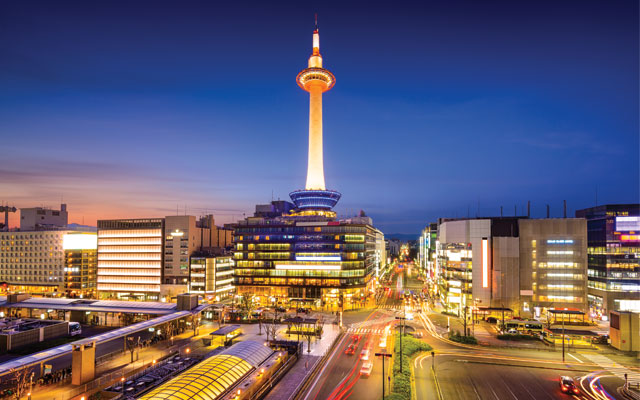Kyoto, once the capital of Japan, keeps its charms flowing for organisers, dangling traditional assets as well as new and improved stay and event facilities.
Kyoto is harnessing its traditional and contemporary assets to build on its growing reputation as a business and association events destination, with 45,683 people taking part in 269 international meetings throughout the city and its surroundings last year.
The number of meetings was a record high while the total number of participants saw a remarkable increase of 54.7 per cent on the previous record. According to ICCA statistics, Kyoto climbed 13 places on the global ranking of meetings cities to 44th spot, the destination’s highest ICCA ranking since 2012.

The Kyoto Convention & Visitors Bureau is refusing to rest on its laurels, however, and officials are pushing ahead with a number of new initiatives designed to attract even more business and association events to the nation’s ancient capital.
“The development of unique venues in Kyoto has been one of our most successful initiatives in attracting new events to our city,” said Yoshiaki Matsui, deputy director of the bureau’s conventions planning division.
“The possibility of holding an event at temples, shrines and other exclusive locations is incredibly appealing,” he told TTGmice. “It is especially unusual to attend an event in a unique venue that is also a UNESCO World Heritage Site.
Currently, there is much excitement around UNESCO World Heritage Site To-ji Temple’s inclusion in Kyoto’s unique venue offerings.
Matsui said event organisers who are considering Kyoto as a destination are looking for quality, rich experiences and security so that their delegates can have peace-of-mind.
“As the quintessential Japanese destination, we have resources that are not found anywhere else and through which we can offer truly special experiences and enhance the overall quality of the meeting,” he added.
“Organisers find that Kyoto’s iconic quality and high appeal makes the destination easy to promote and draw higher numbers of participants.”
Organisers of events – particularly science or medical conventions – are also attracted to the city’s large number of highly regarded universities and companies that specialise in cutting-edge technology.
The bureau is also keen to play up sustainability and support for traditional local industries in the events Kyoto gets, especially since this is a concept already woven deep into the culture and history of the city.
The Kyoto Culture for Meetings Subsidy is provided by the city government and pays up to 300,000 yen (US$2,700) towards the cost of incorporating traditional elements into the event programme. Such elements include tea ceremony
demonstrations, handmade gifts by local artisans for delegates, Zen meditation classes, workshop visits or hands-on classes with local craftsmen, traditional performances like taiko drums and music and dances by maiko and geiko, Kyoto’s unique style of geisha.
Matsui emphasised: “It is incredibly important for us to develop our resilience and promote sustainable practices in meetings in Kyoto.
“Last year, we were the first destination in Asia to join the Global Destination Sustainability Index. We also have a partnership with the city’s Do You Kyoto? scheme, the comprehensive carbon reduction programme that offsets carbon footprint of events held in Kyoto.
He revealed that more organisers are taking a destination’s sustainability into consideration when choosing a host city.
“We want to attract meetings that are interested in contributing to our city, connecting with our community, embracing localism, using our carbon offset programme and supporting our traditional industries,” he said.
Alongside the sustainability push, Kyoto hotels are ramping up their offerings to give organisers additional impetus to take their events forward.
Rihga Royal Hotel Kyoto recently completed a major overhaul of its facilities, including event venues, while Grand Prince Hotel Kyoto is carrying out sweeping renovations of all its 310 guestrooms as well as its restaurants, lobby area and gardens.
New hotels are coming online too. Four Seasons Hotel Kyoto opened recently and a new five-star hotel is scheduled to open close to Kyoto Station in 2019.
Refreshed facilities are also coming up at the Kyoto International Conference Centre (ICC Kyoto), Japan’s first convention facility when it opened in 1966 and venue for numerous high-profile meetings including the 1997 Third Conference of the Parties to the United Nations Framework Convention on Climate Change, where the Kyoto Protocol was adopted.
ICC Kyoto covers 156,000m2 and takes in more than 70 conference rooms, including nine halls with simultaneous translation equipment and a Japanese garden.
When works are completed in June 2018, ICC Kyoto will gain a new hall with capacity for 1,600 people in theatre-style.
The city’s combined efforts are paying off. In September, the World Congress of Neurology will return to Kyoto with around 7,000 delegates, making Kyoto the only city in the history of the congress to be chosen twice as host.





















